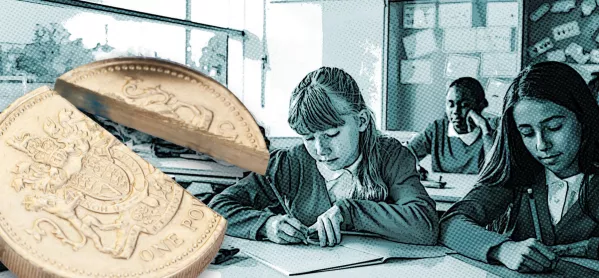3 in 10 parents say school cuts hitting child’s education

Nearly one-third of parents think school funding cuts are having a negative impact on their children’s education, a poll shows.
And two in three parents believe that cuts have had a big impact on schools, according to the survey commissioned by the charity Parentkind.
More than three-quarters of parents surveyed said they would like spending on schools to be a priority for the next government, behind only funding for the NHS.
Furthermore, six in 10 said they would prefer to see school spending increased rather than having their taxes reduced.
More than half of the parents felt that schools were getting a bad deal in terms of public spending. This number included 40 per cent of the parents surveyed who said they vote Conservative.
Parents worried about school funding
Jason Elsom, chief executive of Parentkind, said the survey showed that parents are “really starting to notice the cuts in the school budgets since 2010”.
“As we approach a general election, parents will want to see plans for returning school budgets to 2010 levels, with most parents telling us they are happy to miss out on a tax cut if it means more spending on schools,” he added.
“Parents feel schools get a raw deal from government budgets.”
The survey, carried out by WeThink, asked parents about the impact of a real-terms funding cut of £12 billion to school budgets since 2010 - a figure produced by the Schools Cuts website ran by the NEU teaching union, the Association of School and College Leaders and the NAHT school leaders’ union.
- IFS: Schools need £700 million more funding next year
- Background: Schools face ‘crossing red lines’ with budget cuts
- School budgets: 99 per cent of secondary schools face cuts next year, unions claim
Three in 10 (30 per cent) of parents responding to the survey said they had “noticed a big impact and it has had a negative effect on my child’s education”. Another 36 per cent said they had “noticed a big impact but it hasn’t had a negative effect on my child’s education”, while 27 per cent had not noticed a big impact and 6 per cent said they did not know.
A majority of parents reported they would support a windfall tax, increasing the 45p rate of income tax or a one-off wealth tax to raise money for schools.
The Institute for Fiscal Studies (IFS) has reported that the purchasing power of school budgets is about 4 per cent lower in 2024 than it was in 2010, taking cost increases into account.
There was a 9 per cent real-terms cut to school spending between 2010 and 2019, IFS researcher Luke Sibieta explained. The government has since delivered boosts to school funding, but these have come alongside large cost rises for staff and things like food and energy.
Schools would need another £3.2 billion in extra funding to address the loss of purchasing power since 2010, the IFS has said.
People from across the sector have been warning about the financial difficulties that schools are facing.
Half of school business leaders told the Institute of School Business Leadership (ISBL) earlier this year that they could run out of cash by 2025-26.
Primary schools, especially smaller ones, have been particularly badly affected.
Daniel Kebede, general secretary of the NEU, said: “The neglect of education has failed an entire generation of children. We must not fail another.
“All political parties should take notice. This poll shows that parents want to see investment into education, and they are willing to go without tax cuts to pay for it.”
Mr Kebede called for urgent investment into schools, particularly to fix the school estate and support special educational needs and disabilities (SEND) provision.
Union leaders have previously called for at least £1.7 billion extra for schools in 2024-25 to allow them to afford pay rises for teachers.
In March ParentKind surveyed 1,000 parents who have at least one child aged 4 to 18. The results were weighted to represent parents across England.
A Department for Education spokesperson said figures from the School Cuts website are “misleading”, and “the analysis fails to take into account the significant investment into the high-needs budget, which will rise to £10.5 billion next year - an increase of over 60 per cent in just five years.”
For the latest education news and analysis delivered directly to your inbox every weekday morning, sign up to the Tes Daily newsletter
You need a Tes subscription to read this article
Subscribe now to read this article and get other subscriber-only content:
- Unlimited access to all Tes magazine content
- Exclusive subscriber-only stories
- Award-winning email newsletters
Already a subscriber? Log in
You need a subscription to read this article
Subscribe now to read this article and get other subscriber-only content, including:
- Unlimited access to all Tes magazine content
- Exclusive subscriber-only stories
- Award-winning email newsletters
topics in this article



